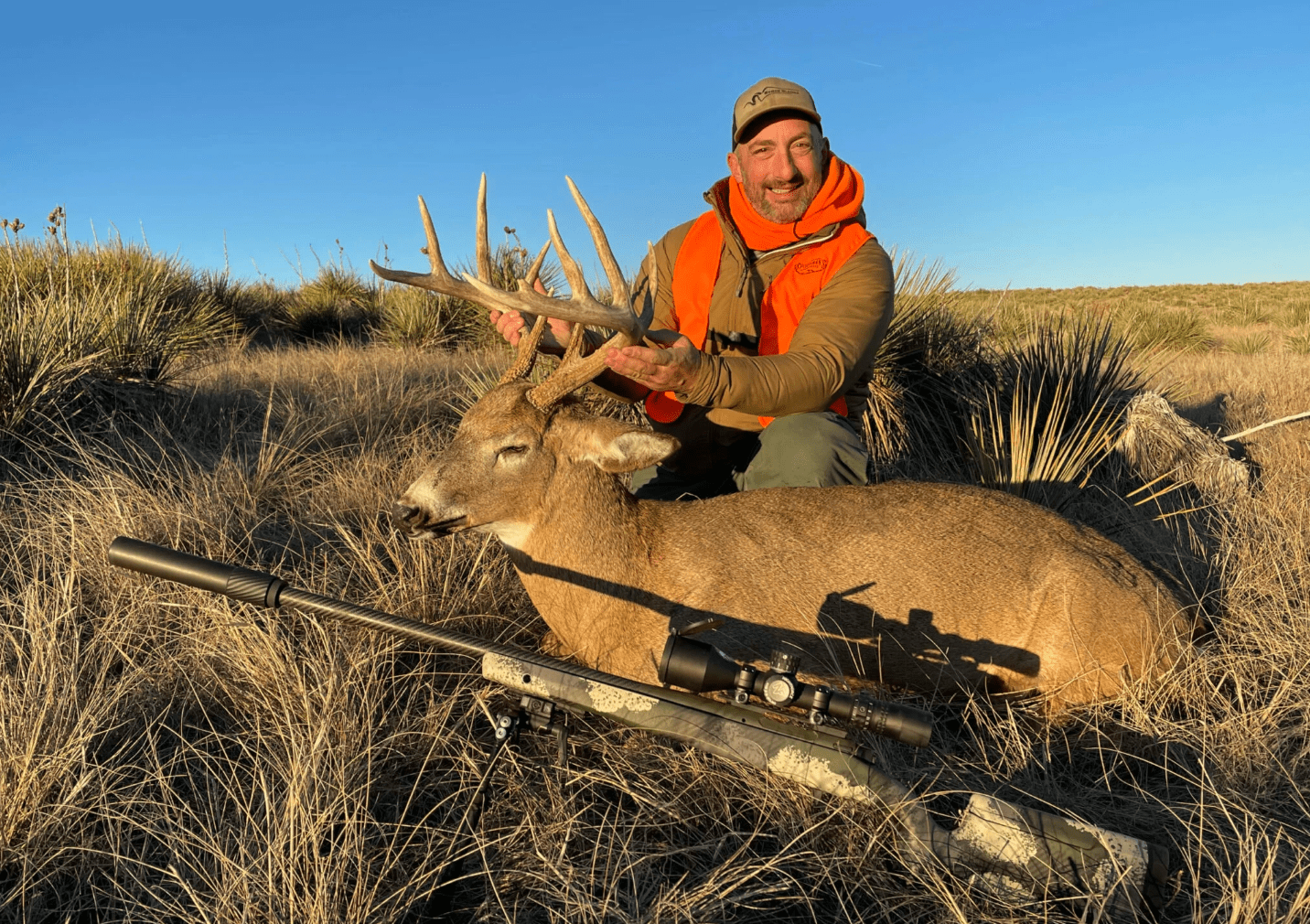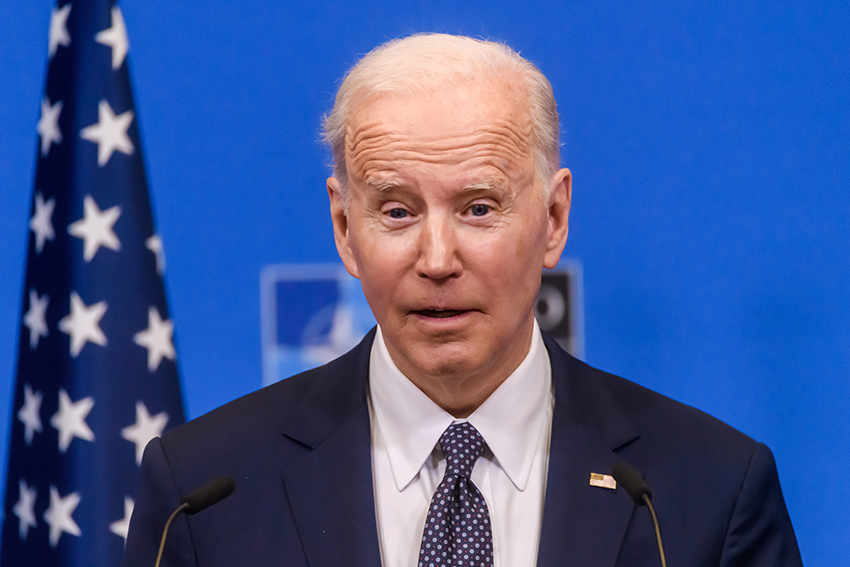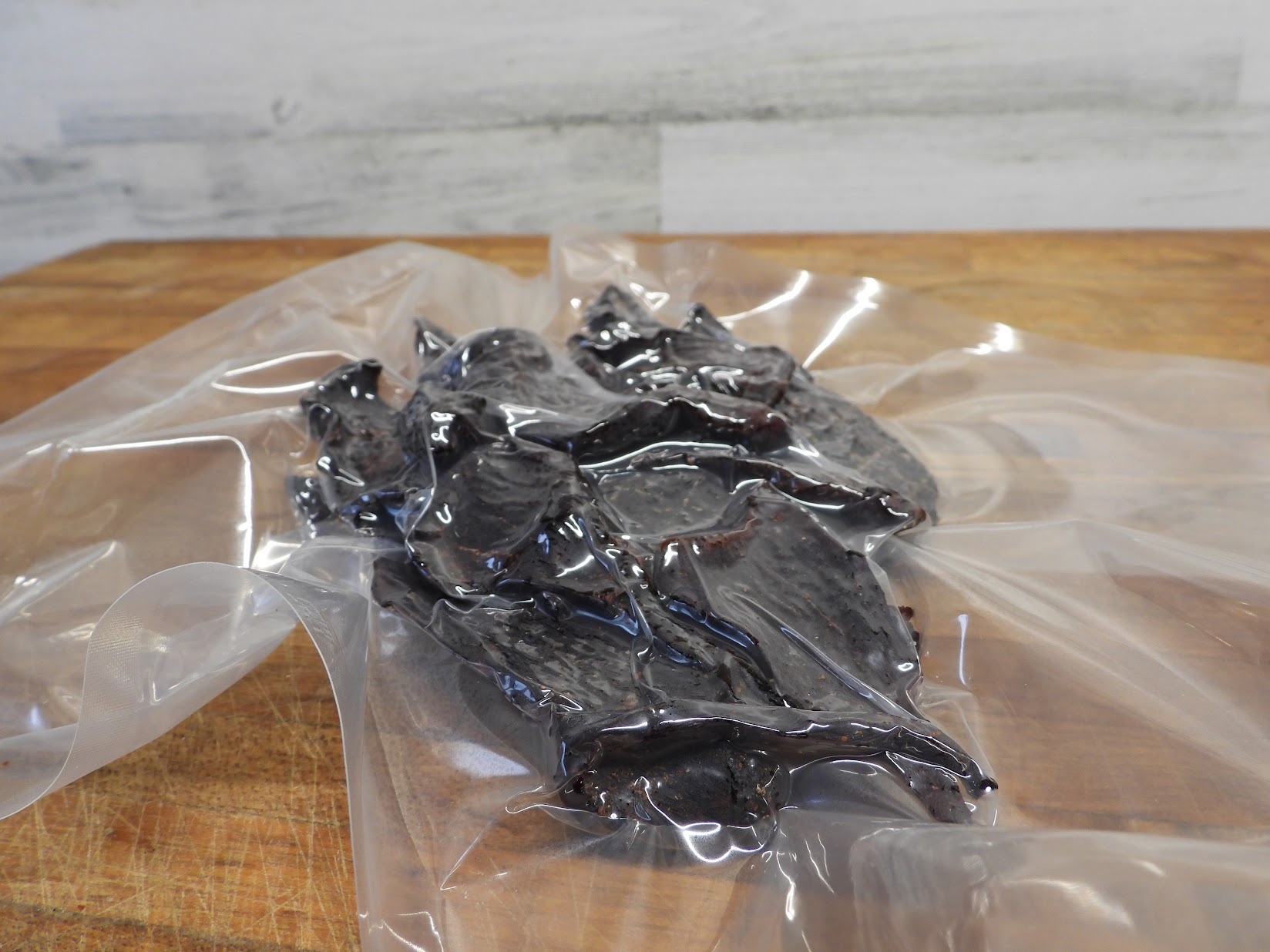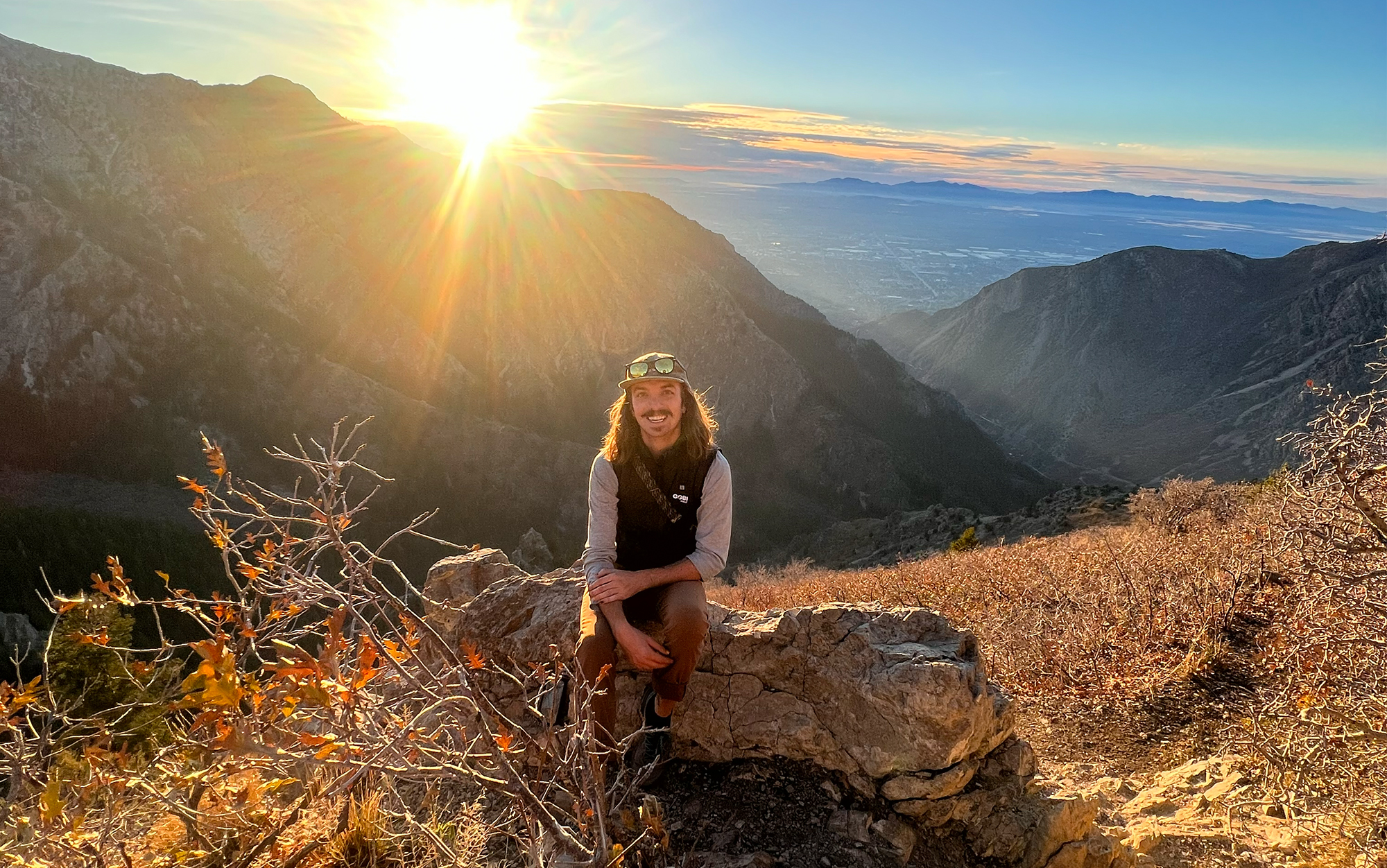Tribes Uphold Centuries-Old Treaty by Delivering Dead Deer to Virginia Governor
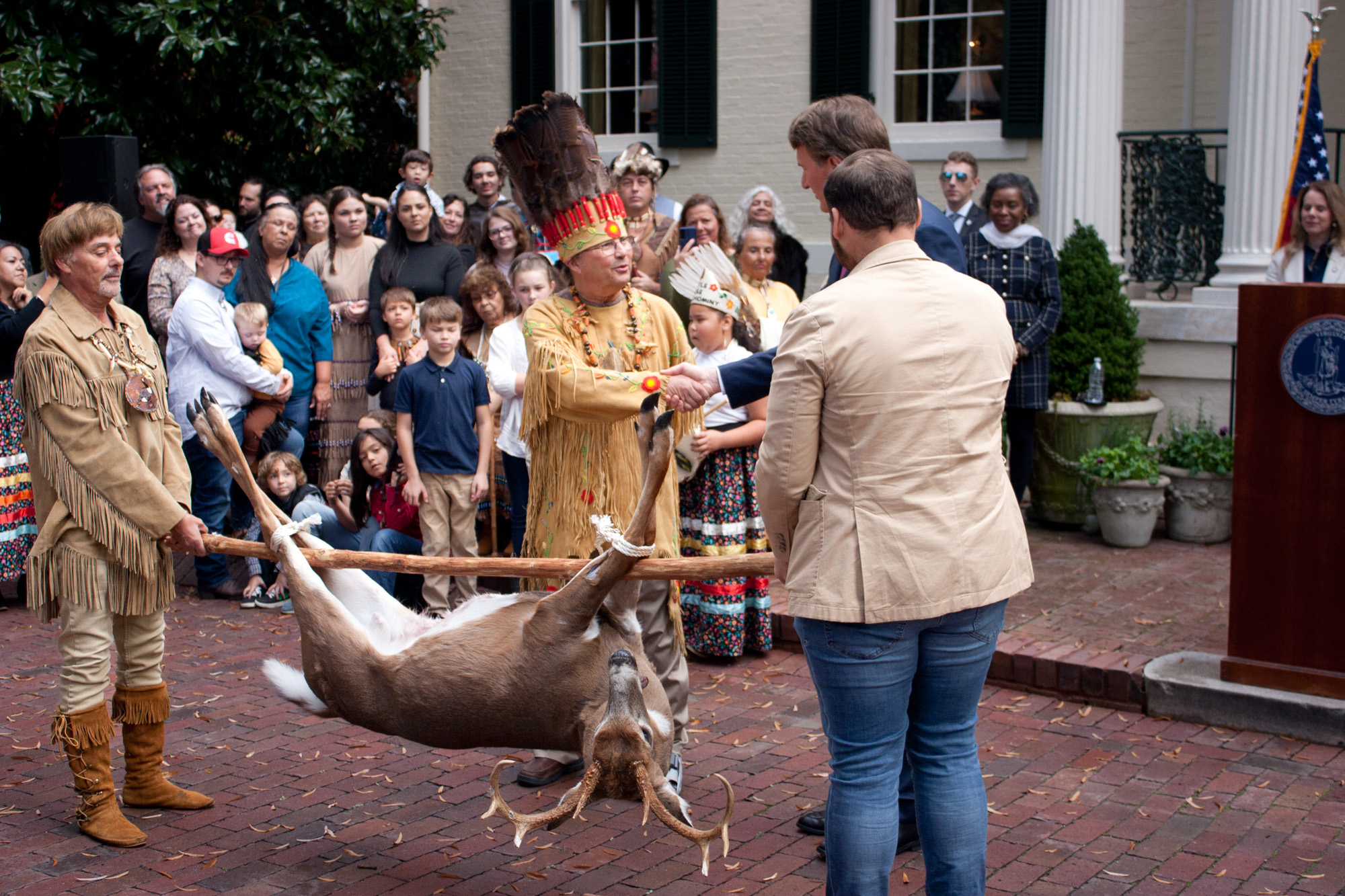
A group of Virginia residents may be the only people in the country who pay taxes in wild game. The Pamunkey and Mattaponi tribes delivered two freshly-harvested whitetail bucks to Virginia Gov. Glenn Youngkin on the steps of the executive mansion in Richmond on Tuesday. It was the 347th observance of a tradition they’ve upheld since 1677.
The Mattaponi and Pamunkey tribes are remnants of the great Powhatan Confederacy that greeted the earliest English settlers. Several centuries ago, the tribes made a series of deals to help end violent conflicts with the colonists. As part of a treaty in 1646, and then another in 1677, the tribes agreed to bring wild game to the governor each year. They’ve done that for more than 100 governors since, some of whom served the British Crown and others the United States.
The tradition continues today.
“If they don’t get a deer, they’ll get whatever they can,” says Lois Morning Glory Carter, who helps preserve the traditions of her tribal culture by giving tours at the Mattaponi Indian Museum. Some years, the tribute might be a turkey, or fish; a few members of the tribe still fish the river each spring with nets for shad, herring and rockfish.
Tribal interest in the annual tribute ceremony is stronger than ever, Carter says, with about 20 to 50 of the tribe’s members traveling to the governor’s mansion in Richmond in recent years.
The ceremony itself creates a striking scene: A man in a suit and tie looking oddly out of place at his own mansion, standing next to a couple of whole dead deer lying on the pavement. It’s a ritual all Virginia governors participate in, regardless of their comfort with hunting. (Youngkin enjoys hunting and fishing, however, and has a lifetime Virginia license.)
After the governor officially accepts the presentation, a steady drumbeat begins, and a musical, modulating chant, a sound pulling listeners back to a time before there was a city of Richmond on this spot. Tribal members in traditional dress dance slowly around their gift of deer. After the ceremony concludes, the bucks are donated to Hunters for the Hungry.
“We are not just affirming a simple agreement,” Youngkin told the crowd gathered around the 9-point and 6-point bucks. “Rather, we are affirming a longstanding relationship that is interwoven into the story of Virginia and the story of America.”
A Centuries-Old Promise
Traditions this old in modern North America are scarce. The Fourth of July holiday only goes back 248 years; Thanksgiving got underway in fits and starts and only became an annual tradition when Abraham Lincoln proclaimed it a national holiday in 1863.
When the 1646 treaty took effect, the colonists were still obeying King Charles I, and the compact with the tribes took pains to emphasize that their leader “do acknowledge to hold his kingdome from the King’s Ma’tie of England.” In other words, the chief had to recognize British rule.
The British themselves were not entirely respectful of their king, however, and cut off Charles’ head a few years later. By 1677, the new treaty took effect under his son. Under the original terms, the tribes were to “Pay unto the King’s Govern’r the number of twenty beaver skins att the goeing away of Geese yearely.” The later agreement kept it at 20 beaver skins, but switched the date to March. These days, the ceremony has returned to the autumn, always taking place just before Thanksgiving.
The years since 1677 have been turbulent for the tribes, and the newer residents around them. Virginia promised the Natives land, and then whittled it away to a fraction. Of the state’s 11 recognized tribes, only two still have reservations: the Pamunkey and the Mattaponi. These two have continued honoring their side of the bargain all the way up to the current King Charles III, even though Gov. Youngkin has no connection with the monarch.
Along the way, the nation splintered into a bloody Civil War. Wars with Native Americans like the Sioux and Comanche tarnished Western ground. At one point Virginia tried to eradicate its tribes altogether while discriminating against both Native Americans and African Americans. World War I and World War II came and went. And still the tribes brought a piece of their hunting success.
Mac Custalow has contributed some of his deer for the Mattaponi’s annual tax over the years. Now 83, Custalow started hunting at 12, toting a double-barreled shotgun and learning the craft from his oldest brother as they chased quail behind a bird dog. They hunted whenever they could, he recalls, and it was an important way for tribe members to put food on the table. (Custalow still has a soft spot for hunting dogs, whether that’s to pursue rabbits or deer. “I love to hear the hounds run,” he says.)
The tribes’ quarry has changed over the centuries as the wildlife has changed. Trapping beavers to meet the initial treaty requirements eventually became impossible. Seen as a walking payday because of their prized furs, beavers vanished from Virginia by the late 1800s. (In the 1930s, the state bought 35 beavers from other states for reintroduction, the Virginia Cooperative Extension notes, and today they’re back in force.)
Deer, too, nearly disappeared. Custalow recalls that his father, born in 1904, never saw a deer until he was 21, when his brother killed a whitetail that had gotten caught in a fence. “People came from all over the county just to see it.” Turkeys were also rare.
But ducks and quail remained plentiful, Custalow says. “We hunted for whatever we could find.”
A New Story in an Old Setting
Drive east of Richmond toward the coast and the population thins. The terrain is rolling, softer than the Appalachian mountains in the western part of the state. Patches of forest, farms, and homes on acre lots dot the landscape. You might spot a deer stand on the edge of a field, or a flock of wild turkeys.
Two rivers, named after the tribes, come together to form the York River at West Point, Virginia (not to be confused with the military academy town of the same name). Upstream a few miles, the Mattaponi reservation of about 150 acres sits on a bluff overlooking the Mattaponi River; about 10 miles away, the larger Pamunkey reservation of more than 1,000 acres lies in an oxbow in the Pamunkey River.
The Mattaponi land isn’t even big enough to hold all the tribe members anymore, much less let them live off the game and fish. Only about 50 of the nearly 400 enrolled members reside there, Carter says. But the hunting tradition survives.
Custalow enjoys sharing his passion for hunting with young people, he says. There’s not much woods on the reservation itself, but a number of tribe members still hunt land nearby in their traditional homeland.
On Tuesday, outgoing Pamunkey Chief Robert Gray said he was honored to appear with the governor and carry on an ancestral tradition. He had personally shot the 6-point given by the Pamunkey in the traditional hunt with hounds.
Hunting on his own, Gray prefers to still hunt, he says. “A good morning for me is getting up, getting on a four-wheeler, riding about a quarter mile, edge of woods, walking about another half mile in, get a deer right at sunup, bring it home, have the meat off the bones, and I’m sitting there with a coffee and Bailey’s by 10 o’clock in the morning.”
For the Virginia tribes, a few centuries isn’t so long. These are direct descendants of hunters who chased deer — and maybe mastodons and bison — across these hills. (Today, they remain free to hunt and fish without a state license.)
Read Next: Q&A with a Tribal Hunter on Storytelling, Taking Photos of Deer, and Family Traditions
The ancient story blends now with a modern one, creating something altogether new. The threads of the tribes’ stories are woven into Virginia’s. They’ve taken jobs in the surrounding cities, adopted modern lifestyles, and fought to defend the United States. Chief Gray served in the Air Force and National Guard. He alluded to the often-troubled past in his 2022 remarks.
“There have been times where things have not been that great between [us], but all I’d say is we have a great relationship now. We enjoy our tribal lands. And that’s why we’re here.”
Read the full article here


